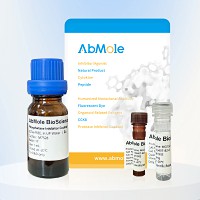
Species: Human
Expression system: Mammalian
Purity: > 95% as determined by reduced SDS-PAGE
Endotoxin: LAL test less than 0.1 ng/µg (1 EU/µg)
Molecular weight: 12.79 KDa
Storage and stability: The freeze-dried protein should be stored at ≤-20℃ and stored stably for one year after receiving. The recombinant protein solution can be stored at 2-8℃ for 2-7 days. The recombinant samples were stable for 3 months at ≤-20°C.
Bioactivity: t cell surface glycoprotein CD3ε Chain is a single channel type I membrane protein. CD3ε contains one immunoglobulin-like domain and one ITAM domain. CD3ε is a polypeptide encoded by the CD3E gene on human chromosome 11. T cell receptor -CD3 complex (TCR/CD3 complex) is involved in T cell development and several intracellular signal transduction pathways. This complex is essential for t cell development and function and is one of the most complex transmembrane receptors. T cell receptor - cd3 complexes have 10 tyrosine-based cytoplasmic immune receptor activation primitives (ITAMs). The TCR/CD3 complex plays an important role in coupling antigen recognition to several intracellular signal transduction pathways.
| Solubility (25°C) | It is not recommended to reconstitute to a concentration less than 100μg/ml. |
| Storage |
Powder -20°C 3 years ; 4°C 2 years In solvent -80°C 6 months ; -20°C 1 month |
| Species | Mouse | Rat | Rabbit | Guinea pig | Hamster | Dog |
| Weight (kg) | 0.02 | 0.15 | 1.8 | 0.4 | 0.08 | 10 |
| Body Surface Area (m2) | 0.007 | 0.025 | 0.15 | 0.05 | 0.02 | 0.5 |
| Km factor | 3 | 6 | 12 | 8 | 5 | 20 |
| Animal A (mg/kg) = Animal B (mg/kg) multiplied by | Animal B Km |
| Animal A Km |
For example, to modify the dose of Compound A used for a mouse (20 mg/kg) to a dose based on the BSA for a rat, multiply 20 mg/kg by the Km factor for a mouse and then divide by the Km factor for a rat. This calculation results in a rat equivalent dose for Compound A of 10 mg/kg.
| Related Recombinant Proteins Products |
|---|
| Recombinant Human Serpin A12 (E.coli, N-GST)
Vaspin (Visceral Adipose-Specific SERPIN) is a newly described adipokine. Vaspin is also a unique insulin sensitizing adipocytokine in obesity. |
| Recombinant Human B2M Protein (Mammalian, C-6His)
β-2-Microglobulin (B2M) is a secreted protein with 1 Ig-like C1-type (immunoglobulin-like) domain which belongs to the beta-2-microglobulin family. B2M may adopt the fibrillar configuration of amyloid in certain pathologic states. |
| Recombinant Mouse E-Selectin/CD62E Protein (HEK293)
E-selectin, also known as endothelial leukocyte adhesion molecule-1 (ELAM-1) and CD62E, is an inducible adhesion molecule that is expressed on the surfaces of stimulated vascular endothelial cells and is sometimes involved in cancer cell metastasis. |
| Recombinant Human DPP4/CD26 (Mammalian, C-6His)
DPP4/CD26 is a signal-anchor for type II membrane protein that belongs to the peptidase S9B family. DPP4/CD26 acts as a positive regulator of T-cell coactivation, by binding at least ADA, CAV1, IGF2R, and PTPRC. It’s binding to CAV1 and CARD11 induces T-cell proliferation and NF-kappa-B activation in a T-cell receptor/CD3-dependent manner. |
| Recombinant Human USP14 (E.coli, N-6His)
USP14 belongs to the ubiquitin-specific processing (USP) family which is a deubiquitinating enzyme (DUB) with His and Cys domains. USP14 acts also as a physiological inhibitor of endoplasmic reticulum-associated degradation (ERAD) under the non-stressed condition by inhibiting the degradation of unfolded endoplasmic reticulum proteins via interaction with ERN1. |


Products are for research use only. Not for human use. We do not sell to patients.
© Copyright 2010-2023 AbMole BioScience. All Rights Reserved.
